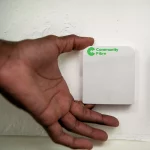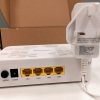UPD 3 ISPs Snub BSG Launch of New UK Net Neutrality Code of Practice
The Broadband Stakeholders Group (BSG), a UK government supported think-tank, has launched a new Voluntary Code of Practice to ensure “the provision of full and open internet access” and to prevent ISPs using Traffic Management practices to “degrade the services of a competitor“. But three of the country’s largest ISPs have refused to join.
It’s understood that the Open Internet Code of Practice has so far been signed by 10 major telecoms operators (e.g. BT, TalkTalk, Sky Broadband, O2 / BE Broadband, KC, PlusNet, GiffGaff, Tesco Mobile and Three UK etc.), yet Everything Everywhere (T-Mobile and Orange UK), Virgin Media and Vodafone felt that the code was either too vague or not practical enough to meet the modern day reality of internet provision.
Advertisement
Ed Vaizey, Minister for Communications, said:
“This voluntary agreement is great news for consumers. It marks a significant commitment from the leading ISPs to uphold the principles of an open internet and gives certainty to their customers. The internet has been built on openness and low barriers to entry, and this agreement will ensure that continues. By committing to transparency, these ISPs are empowering their customers to make informed decisions about the services they want.”
Pamela Learmonth, CEO of the Broadband Stakeholder Group, said:
“With this code ISPs are making practical, tangible commitments to the open internet. The open internet model has long supported the innovation of new services and allowed consumers to discover informative, useful and creative applications, services and content and this must continue. At the same time the code will also support an environment where new business models for internet-based services to the benefit of consumer choice can be developed.”
At present most ISPs employ Traffic Management or Traffic Shaping as a perfectly acceptable means to balance the performance of their networks, which allows the majority of customers to avoid being unfairly affected by a minority of heavy users. This is often done by restricting internet traffic (speed) to busy services (e.g. P2P) or more generally at peak times of day.
Many ISPs prefer the above method to either raising prices or being more realistic about their usage allowances. Sadly some operators are known to restrict certain services, such as VoIP (e.g. Skype) and P2P (File Sharing), to such an extreme that they are no longer usable. Similarly a number of operators have IPTV services, such as BT and TalkTalk, which require flexibility in order to favour content from specific providers.
At the same time many consumers remain concerned that ISPs could potentially abuse their position by favouring content providers based on who pays them the most cash. So far this Digital Mafia style model hasn’t worked because of regulatory concerns, the fear of upsetting users (i.e. imagine if Skype, Facebook or Google stopped working) and the simple fact that most content providers have no interest in paying twice for their bandwidth or being charged into oblivion.
As a result of all this the BSG last year introduced the first pilot of their voluntary Traffic Management code (here), which required ISPs to describe their restrictions in more detail and explain how different types of services might be affected by such policies. The new code is the finalised version of that and includes three key commitments.
Advertisement
The 3 New Open Internet Code Commitments
1. Ensure that full and open internet access products, with no blocked services, will be the norm within their portfolio of products.
2. Provide greater transparency in instances where certain classes of legal content, applications and/or services are unavailable on a product. These products will not be marketed as “internet access” and signatories will be obliged to ensure that any restrictions are clearly communicated to consumers.
3. Not [to] target and degrade the content or applications of specific providers.
In fairness the code is, as Vodafone and EE claim, somewhat vague. On the other hand it also makes specific exceptions for any court ordered requirements (e.g. piracy website blocking) or the Internet Watch Foundation’s (IWF) measures to filter out illegal child abuse websites. Likewise Parental Controls, Traffic Management measures to manage normal congestion and or service restrictions (e.g. data caps), such as those imposed as part of a users contract, are also not covered.
So far both the European Commission (EC) and Ofcom have called upon broadband ISPs to ensure that consumers continue to benefit from access to all “legal content [and] service[s]” (here), although nobody has seen a need to impose any form of mandatory regulation.
Open Internet Code of Practice (PDF)
http://www.broadbanduk.org/component/option,com_docman/task,doc_view/gid,1340/Itemid,63/
UPDATE 12:17pm
The Internet Telephony Services Providers Association (ITSPA) has welcomed the new code but is disappointed that not all communications providers signed up.
Advertisement
Eli Katz, Chair of ITSPA, said:
“ITSPA welcomes this excellent initiative and is grateful for the work conducted by the BSG to get to this point. Our members have long been concerned about some of the traffic management and transparency practices of certain CPs, particularly by some mobile operators. It is unfortunate however that not all CPs have signed up, as ITSPA feels that all consumers should have the ability to clearly determine whether or not their internet access is truly open.
It is vital that all of industry endorses this document to ensure consumers are provided with more transparent information and that new and innovative Internet services can grow, without fear of anti-competitive behaviour.
We applaud the signatories, including O2 and Three, in their approach to traffic management practices, in particular allowing VoIP services and not adding in charges. ITSPA would encourage all major MNOs as well as all fixed line providers to sign up to this code. We also look forward to Ofcom’s upcoming review of traffic management practices this summer, to ensure all CPs are following the principles outlined by the Communications Minister. This is an opportunity for the UK to lead the world in net neutrality, which will allow the communications industry to build innovative new services, benefit consumers, and grow UK businesses.”
Mark is a professional technology writer, IT consultant and computer engineer from Dorset (England), he also founded ISPreview in 1999 and enjoys analysing the latest telecoms and broadband developments. Find me on X (Twitter), Mastodon, Facebook, BlueSky, Threads.net and Linkedin.
« ASA Ban Virgin Media TV and Website Ads Over Misleading Performance Claim
















































Comments are closed